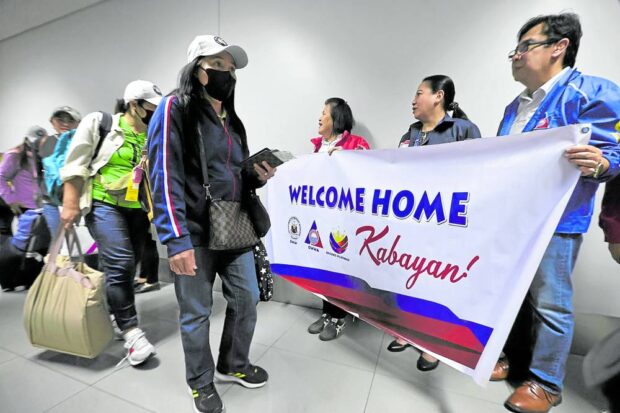
ESCAPE FROM WAR| Sixteen Filipinos arrive from Israel and Gaza Strip on Wednesday at Ninoy Aquino International Airport. Officials said most of the 30,000 Filipinos in Israel had opted to stay, while about 80 in the besieged Palestinian enclave had agreed to be flown home. (Photo by GRIG C. MONTEGRANDE / Philippine Daily Inquirer)
MANILA, Philippines —Caregiver Catherine Tolentino often woke up to a view of Gaza from her window in the apartment where she stayed with her employer, having no inkling things would take a drastic turn one morning, on Oct. 7.
As Hamas militants launched coordinated air, land and sea attack on Israel, triggering a fierce retaliation by the Israelis and the declaration of war, the 47-year-old found herself hiding in a dark bomb shelter with her employer. They had no power, food or water.
Forced to leave their hiding place in search of provisions days later, Tolentino stepped into a city in ruins, the skies ablaze from Israel’s bombardment and sirens wailing in the distance.
Fearing she was wasting her last moments, she messaged her children: “I love you, please take care of yourself. I’m alright but my phone’s battery might suddenly die.” To her husband, she wrote: “I love you. Take care of yourself.”
On Wednesday afternoon, Tolentino was back home, ready to reunite with her family, as she joined 15 other overseas Filipino workers (OFWs) on a repatriation flight arranged by the government.
Speaking with reporters at Ninoy Aquino International Airport, she said she was counting the hours until she saw her loved ones again in Lubao, Pampanga.
Plea to stay
Another OFW, Mayline Rivera, said she was grateful to be back home but a sense of despair nagged her on the flight to the country. She spoke of her sudden separation from her 90-year-old patient whom she had to leave behind in Tel Aviv.
On the night of her departure, Rivera’s patient, who was battling dementia, had a lucid moment and pleaded with her not to leave Israel, she recalled. “I don’t know if I’ll ever see her again, but I hope I get a tourist visa soon so I can go there to thank her and her family for all their help,” she said. Rivera said she decided to be repatriated for her own mental health.
The Department of Health earlier said the government would look after both the physical and mental well-being of the repatriates, should they have such concerns.
Foreign Undersecretary Eduardo de Vega noted that most OFWs in Israel opted not to take the flight back to the Philippines since they were based far from the area of hostilities, mainly in Israel’s southern regions.
Many of them have also developed a strong sense of attachment to their host country, he added.
“Our [people] are resilient. It is possible too that, being English-speaking and of Christian faith, they feel a connection to Israel—which Thais (for example) do not. So they are comfortable with sticking it out instead of leaving the country,” he said.
Safety of 30,500
According to the Department of Migrant Workers (DMW) officer in charge Undersecretary Hans Leo Cacdac, the agency has confirmed the safety of some 30,500 OFWs working in Israel as the bloody Israel-Hamas conflict waged.
“They will continuously be assisted, including their travel to their respective hometowns,” Cacdac said.
Another 100 Filipinos residing in Gaza are also to be repatriated once they are able to cross the border to Egypt, where the Philippine Embassy is located, De Vega said during a press briefing.
To date, no new Filipino casualties have been reported, after three Filipinos were confirmed killed during the Hamas attack, the official added.
According to De Vega, the Israeli government has alerted the Philippine Embassy in Tel Aviv that the Palestine side of the Rafah border might soon be opened to let foreign nationals cross to Egypt, including the Filipinos trapped in Gaza.
“It’s just a question of the opening of the corridor. And right now it’s still closed, but the Israelis have always said it could be any day now,” De Vega said.
Asked to give a timeline, he said there was none.
“They don’t give assurances. They always say, be prepared at any moment’s notice, that suddenly it will be open,” the undersecretary disclosed. De Vega said the Philippine government remained “confident in [Israel’s] promise that it will protect Filipinos.”
Meanwhile, the number of Filipinos requesting to be repatriated from the Gaza Strip continues to go up, now at around 80 requests.